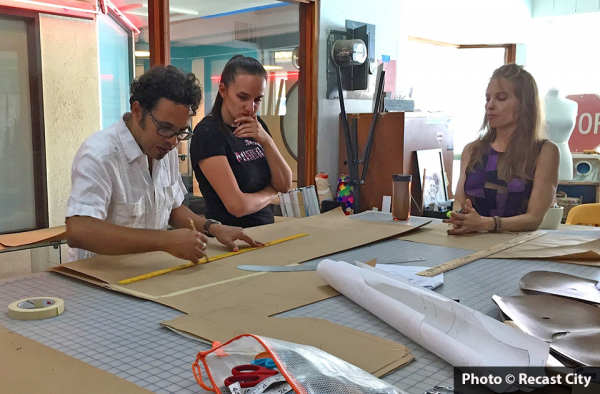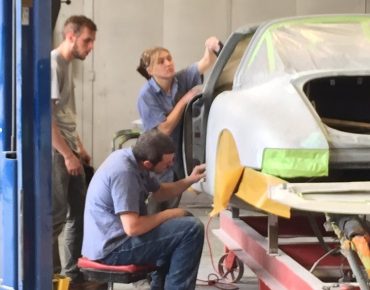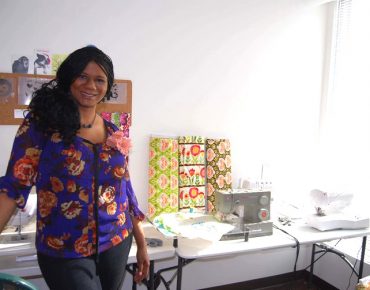Guest blogger Ilana Preuss is founder of Recast City, an enterprise that supports communities’ efforts to strengthen local economic resilience by expanding small-scale manufacturing, building a pipeline for jobs, repositioning real estate for new and emerging business ventures, supporting entrepreneurs of color, revitalizing downtown areas, and more. Ilana will be the featured panelist on Groundwork USA’s free upcoming webinar, Advancing Small-Scale Manufacturing as an Economic Development Strategy. Please join us on Wednesday, July 26, as Ilana shares her rich insights into how promoting entrepreneurship and small-scale manufacturing in low-income communities and communities of color can play a key role in advancing inclusive and equitable economic development. Register today.
Smart community leaders recognize the importance of the small-scale manufacturing business sector but often still do not know where to find the community of owners. These business owners often go it alone, creating their product at home or leasing space in an unusual location, and subsist without any municipal or local chamber of commerce support.

Yet comprehensive outreach to identify small-scale manufacturing business owners is a key first step to understand this business sector, its challenges, and its opportunities for growth within the community. In many cases, a small amount of business development support to an existing business will help it to scale. This support can also add good paying jobs to the local workforce, or help the business find production space in a target reinvestment area for the community.
How to find them
Outreach to identify these businesses often needs to be creative. Here are a few strategies – some part of a regular business outreach routine and some more grassroots.

- Word of mouth – This one takes a lot of time, but will be your most effective way to find the small producers. Identify five to ten businesses you already know. Ask each business to recommend two or more business owners to include in outreach activities. Ask each of those businesses to recommend others. Make sure to ask people to recommend owners that represent your diverse populations.
- Faith, ethnic, or cultural organizations’ events – Talk to community leaders at these trusted institutions. Sit down over a cup of coffee and tell them about your initiative to strengthen local production businesses and why it is important for the community. Ask these leaders to talk to the members of their organization and find out who has production based businesses – either at home or in a leased space. Invite their members with production businesses to a discussion at the organization’s location, in partnership with the community leader, to build trust with this audience.
- Fairs, festivals and markets – Many micro-businesses sell their products at local fairs, festivals or markets. Collect the list of businesses at each of these events in your community, or in nearby locations – including ethnic and cultural festivals. Use these lists to reach out to local business owners.
-

Photo: Yinibini Baby Small Business Development Center and Manufacturing Extension Partnership – These national networks support local small business (SBDC) and help to retain/strengthen local manufacturing (MEP). Reach out to your local Center or state MEP representative and ask them for a list of production businesses in your area. These are also great resources for the businesses you identify along the way.
- Chambers of Commerce – Talk to staff at your local chamber and find out if they have any special programming or outreach to small businesses and production-based businesses. Make sure to contact local Asian, Black, Hispanic or other community Chambers of Commerce. Mine these lists to find additional production business owners for your outreach.
- Entrepreneurship center – Reach out to local entrepreneurship programs, incubators, accelerators, and tech hubs. Find out if any of the businesses they support create Internet of Things, wearables, or other electronic products. Identify less-tech focused participants too, such as product-based businesses that are scalable in textile or food.
- Community College, Fab Lab, makerspace – Talk to people at these community spaces and find out who is working on a product-based business. They may be members of a Fab Lab or makerspace, or they may be in a trades program at the local college.
- Non-profit community loan fund or community development financial institutions – These institutions are loan making entities that work with local small businesses. They fund many different types of businesses, and may be able to provide you with a list of clients or partner with you to promote your outreach. Working with organizations like this is a great opportunity to build a relationship where you can send them potential clients in the future, and they can in turn help direct producers back to you.
What to ask them
Communities should compile information about these businesses including at minimum – owner’s name, contact information, type of product (food/beverage, textile, electronic, wood, metal…), and type of sale (retail or wholesale, B2B or B2C).
The community should focus on additional information that will help to understand the economic impact and economic potential in this sector over the long-term. Through in person and online surveys, communities should also collect information such as – year established, number of employees (full time and part time), square footage of lease (or home-based), primary products, plans to scale, capital expansion/financing needs, range of annual revenues or sales. The information should be consistent with local economic development surveys of larger businesses.
Who to ask
Each community needs to decide if this outreach is all inclusive – full and part time production businesses located anywhere in the community, or if the outreach should be focused on a sub-group – only full time businesses, only businesses with two or more employees, only businesses with one to ten employees, only businesses located in a target neighborhood or region, or only businesses leasing space and not home-based. Most communities will benefit from starting with a broad goal to identify all full-time time businesses with 30 or fewer employees, including sole proprietorships, and looking across materials including textiles (fashion), hardware prototyping, wood, metal, and food production.
For great examples of how to get this done (and fund it) check out SFMade which receives city funding to identify and organize local small-scale manufacturing businesses, MadeinDC which receives a grant from DC’s Department of Small and Local Business Development, MadeBy in Memphis which is supported by the city and local philanthropy, and MakeKnox which launched out of the Knoxville Maker City Summit.
